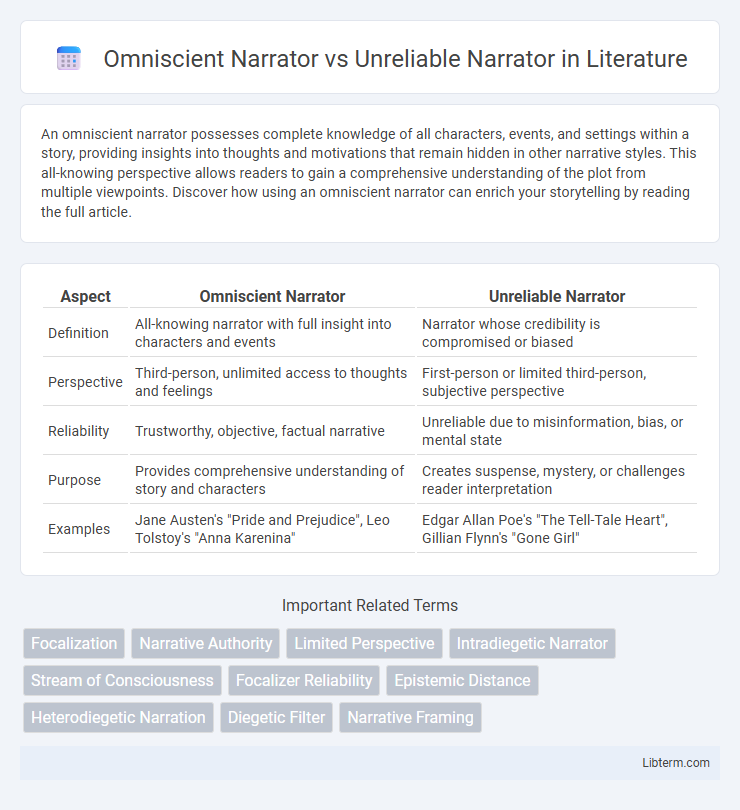An omniscient narrator possesses complete knowledge of all characters, events, and settings within a story, providing insights into thoughts and motivations that remain hidden in other narrative styles. This all-knowing perspective allows readers to gain a comprehensive understanding of the plot from multiple viewpoints. Discover how using an omniscient narrator can enrich your storytelling by reading the full article.
Table of Comparison
| Aspect | Omniscient Narrator | Unreliable Narrator |
|---|---|---|
| Definition | All-knowing narrator with full insight into characters and events | Narrator whose credibility is compromised or biased |
| Perspective | Third-person, unlimited access to thoughts and feelings | First-person or limited third-person, subjective perspective |
| Reliability | Trustworthy, objective, factual narrative | Unreliable due to misinformation, bias, or mental state |
| Purpose | Provides comprehensive understanding of story and characters | Creates suspense, mystery, or challenges reader interpretation |
| Examples | Jane Austen's "Pride and Prejudice", Leo Tolstoy's "Anna Karenina" | Edgar Allan Poe's "The Tell-Tale Heart", Gillian Flynn's "Gone Girl" |
Understanding Narrative Perspectives
Understanding narrative perspectives involves recognizing the omniscient narrator as an all-knowing voice providing comprehensive insight into characters, settings, and events, ensuring a reliable and complete viewpoint. In contrast, the unreliable narrator presents a subjective, biased, or distorted version of the story, requiring readers to critically evaluate inconsistencies and hidden motives. Mastery of these narrative techniques enhances literary analysis by highlighting how authorial intent shapes readers' interpretation and engagement.
Defining the Omniscient Narrator
The omniscient narrator possesses complete knowledge of all characters' thoughts, feelings, and motivations, offering a god-like perspective on the story. This narrative voice can freely reveal events and insights beyond any single character's experience, providing a comprehensive understanding of the plot. In contrast to an unreliable narrator, the omniscient narrator remains impartial and trustworthy, ensuring truthful and all-encompassing storytelling.
Exploring the Unreliable Narrator
Exploring the unreliable narrator reveals a storytelling technique where the narrator's credibility is compromised, creating suspense and deepening thematic complexity. This narrative device often involves biased perspectives, distorted truths, or incomplete information, compelling readers to question the authenticity of the account. Writers such as Agatha Christie and Gillian Flynn effectively utilize unreliable narrators to challenge readers' assumptions and enhance plot twists.
Key Differences Between Omniscient and Unreliable Narrators
An omniscient narrator possesses complete knowledge of all characters, events, and settings, providing a comprehensive and impartial viewpoint throughout the story. In contrast, an unreliable narrator offers a biased, distorted, or limited perspective, often intentionally or unintentionally misleading the audience. The key difference lies in the omniscient narrator's authority and truthfulness versus the unreliable narrator's subjective and potentially deceptive narrative.
Advantages of an Omniscient Narrator
An omniscient narrator offers a comprehensive perspective by revealing the thoughts, feelings, and motivations of multiple characters, enriching the reader's understanding of the story. This narrative style provides seamless transitions between scenes and locations, enhancing the story's scope and depth. The omniscient narrator's objective tone can also create a balanced view, allowing readers to form their interpretations without bias.
The Impact of an Unreliable Narrator on Storytelling
An unreliable narrator shapes storytelling by creating ambiguity and compelling readers to question the truth of the narrative, enhancing engagement and suspense. This narrative technique allows exploration of subjective reality, psychological complexity, and multiple perspectives within the story. The unpredictable nature of an unreliable narrator challenges traditional assumptions about truth, deepening thematic resonance and emotional impact.
Techniques for Writing Omniscient Narration
Techniques for writing omniscient narration include using an all-knowing perspective that reveals characters' thoughts, emotions, and background information to create a comprehensive understanding of the story. Employing varied narrative scopes allows seamless shifts between different characters' viewpoints and broader world-building details. Maintaining an objective yet insightful tone ensures the narrator guides readers without bias, enriching the plot through deep psychological and contextual insights.
Techniques for Crafting Unreliable Narration
Techniques for crafting unreliable narration include manipulating the narrator's perspective through limited knowledge, intentional omissions, and contradictory statements that create ambiguity. Authors often use subjective language, biased interpretation of events, and psychological complexity to obscure truth and challenge reader trust. Employing fragmented storytelling and inconsistent details amplifies the narrator's unreliability, fostering deeper engagement and critical analysis from the audience.
Famous Examples in Literature
The omniscient narrator, exemplified by the all-knowing voice in Leo Tolstoy's *War and Peace*, provides a comprehensive perspective on characters and events, revealing inner thoughts and broader contexts. In contrast, the unreliable narrator, such as the disturbed Holden Caulfield in J.D. Salinger's *The Catcher in the Rye*, offers a subjective and often distorted view, compelling readers to question the truthfulness of the narrative. Famous literary examples highlight how omniscient narration ensures clarity and depth, while unreliable narration introduces ambiguity and complexity.
Choosing the Right Narrator for Your Story
Selecting the right narrator hinges on the intended impact and reliability of the storytelling voice. An omniscient narrator offers a comprehensive, all-knowing perspective, providing readers with insights into multiple characters and events, while an unreliable narrator creates suspense and engages readers through subjective and potentially misleading interpretations. Writers should consider the desired narrative depth and reader engagement to decide which perspective best serves the story's themes and overall effect.
Omniscient Narrator Infographic

 libterm.com
libterm.com